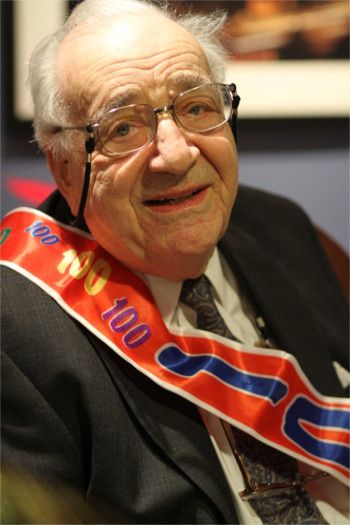People Column
George Bookman, who joined the
OPC in 1958 as a financial reporter for Time
magazine, turned 100 today, Monday, Dec. 22. He celebrated the landmark during
the preceding weekend with family and friends in Seattle, where he moved last
year to be close to his son. The OPC was among those who sent best wishes.
Bookman had a remarkable career
as a journalist and public relations while generously giving time to the OPC
and other organizations working to improve journalism. He headed OPC’s Admissions
Committee for many years, served on the OPC Board and its Freedom of the Press
Committee. He is a former president of the Deadline Club, appeared in the Financial Follies of the New York Financial
Writers’ Association, belonged to Sigma Delta Chi and is a long-time member of the Silurians.
He got his start in journalism as a teen writing for a newspaper on the Jersey
shore. While a student at Haverford College, Bookman had a summer internship in
the financial department of the New York World-Telegram. After graduating
in 1936, he wrote, edited and sold ads for The
Villager in Greenwich Village. In 1939, he was hired by U.S. News to report on New Deal
government agencies. He then moved to The
Washington Post, where he covered the White House and other
assignments.
As World War II approached, he joined
what later became the Office of War Information and with a recommendation from
President Roosevelt’s press secretary Steve Early supporting his desire to be
sent overseas, he was assigned to Brazzaville in what was then French Equatorial
Africa. He went next to Beirut and then Italy as the country was being
liberated. He oversaw news and propaganda in the forward area as Allied troops
advanced and Germans retreated. During a home leave in 1944, he married Janet
Schrank Madison, who had worked for United Press in Washington. They were
married for 57 years until her death in 2002.
After the war, the Post offered him his old job back but at
the salary he had earned four years earlier, before he had married and had a
new family to support. He ended up in the Washington Bureau of Time magazine and then he became an
editor at Fortune in New York. In
1962, he became public relations chief of the New York Stock Exchange and
stayed there for 11 years before joining the New York Botanical Garden as
director of public relations. He started his own consulting business in 1979
and worked until he was nearly 86.
As he was turning 94, he finished
his autobiography, Headlines Deadlines
and Lifelines, which was published in 2009.

